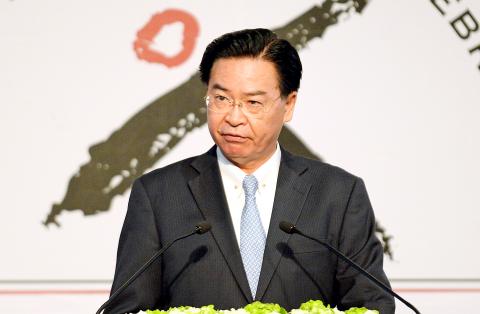Minister of Foreign Affairs Joseph Wu (吳釗燮) yesterday criticized China for lodging a protest against Japan’s Sankei Shimbun after it published an interview with him, saying that Beijing infringed on the press freedom of the two Asian democracies.
“It is astonishing that the authoritarian China not only cannot tolerate freedom of speech and of the press inside its borders, but it has also interfered with that enjoyed by the two most democratic Asian nations with the greatest press freedom,” Wu was quoted by Ministry of Foreign Affairs spokesman Andrew Lee (李憲章) as saying.
The incident proves that China poses a threat to the global values of freedom and democracy, Wu said, calling on like-minded nations to work together to prevent the trend from spreading.

Photo: Lin Cheng-kung, Taipei Times
China’s protest also shows that “we have done something right,” Wu added.
In the interview published on Wednesday, Wu called for Taiwan and Japan to initiate a security dialogue on the grounds that ensuring security is a shared responsibility of the two nations.
Wu also criticized China for limiting the room for interpretation of its “one China” principle, which he said cannot be accepted by Taiwanese.
After the US severed diplomatic ties with Taiwan in 1979, it enacted the Taiwan Relations Act that laid down a legal foundation for a security dialogue between Washington and Taipei, the report said.
However, there is no legal foundation for exchanges between Japan and Taiwan after they broke off relations in 1972, it added.
The Chinese embassy in Japan lodged a stern protest against the Sankei Shimbun, saying that Taiwan is a part of China and that the article included portions that advocated Taiwanese independence.
When the newspaper opened a branch office in China, it pledged to abide by the “one China” principle in its reporting, a consensus that the paper had contravened, the embassy said.
“In the process of the normalization of China-Japan relations, we hope to see the Sankei Shimbun publish reports that are conducive to the establishment of mutual understanding between the Japanese and Chinese people,” the embassy said.
Relations between Taiwan and Japan are handled by two non-governmental agencies, the Taiwan-Japan Relations Association and the Japan-Taiwan Exchange Association, which last year changed their names to better reflect their functions.
The Taiwan-Japan Relations Association was previously called the Association of East Asian Relations, while the Japan-Taiwan Exchange Association was previously called the Interchange Association, Japan.

A Ministry of Foreign Affairs official yesterday said that a delegation that visited China for an APEC meeting did not receive any kind of treatment that downgraded Taiwan’s sovereignty. Department of International Organizations Director-General Jonathan Sun (孫儉元) said that he and a group of ministry officials visited Shenzhen, China, to attend the APEC Informal Senior Officials’ Meeting last month. The trip went “smoothly and safely” for all Taiwanese delegates, as the Chinese side arranged the trip in accordance with long-standing practices, Sun said at the ministry’s weekly briefing. The Taiwanese group did not encounter any political suppression, he said. Sun made the remarks when

The Taiwanese passport ranked 33rd in a global listing of passports by convenience this month, rising three places from last month’s ranking, but matching its position in January last year. The Henley Passport Index, an international ranking of passports by the number of designations its holder can travel to without a visa, showed that the Taiwan passport enables holders to travel to 139 countries and territories without a visa. Singapore’s passport was ranked the most powerful with visa-free access to 192 destinations out of 227, according to the index published on Tuesday by UK-based migration investment consultancy firm Henley and Partners. Japan’s and

BROAD AGREEMENT: The two are nearing a trade deal to reduce Taiwan’s tariff to 15% and a commitment for TSMC to build five more fabs, a ‘New York Times’ report said Taiwan and the US have reached a broad consensus on a trade deal, the Executive Yuan’s Office of Trade Negotiations said yesterday, after a report said that Washington is set to reduce Taiwan’s tariff rate to 15 percent. The New York Times on Monday reported that the two nations are nearing a trade deal to reduce Taiwan’s tariff rate to 15 percent and commit Taiwan Semiconductor Manufacturing Co (TSMC, 台積電) to building at least five more facilities in the US. “The agreement, which has been under negotiation for months, is being legally scrubbed and could be announced this month,” the paper said,

Japan and the Philippines yesterday signed a defense pact that would allow the tax-free provision of ammunition, fuel, food and other necessities when their forces stage joint training to boost deterrence against China’s growing aggression in the region and to bolster their preparation for natural disasters. Japan has faced increasing political, trade and security tensions with China, which was angered by Japanese Prime Minister Sanae Takaichi’s remark that a Chinese attack on Taiwan would be a survival-threatening situation for Japan, triggering a military response. Japan and the Philippines have also had separate territorial conflicts with Beijing in the East and South China